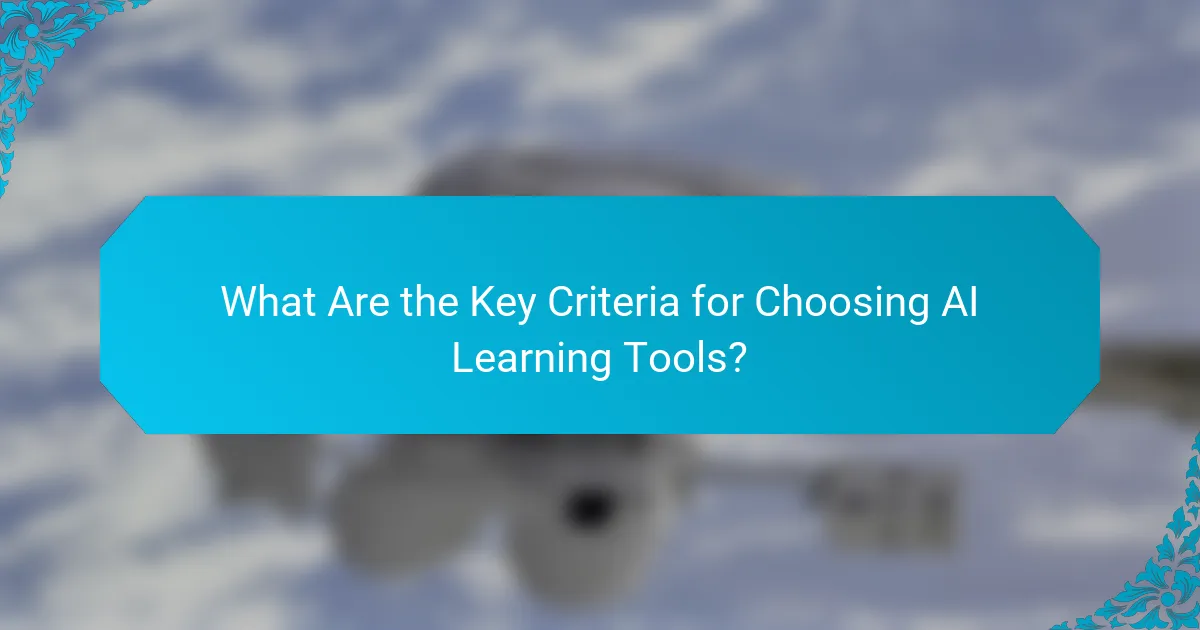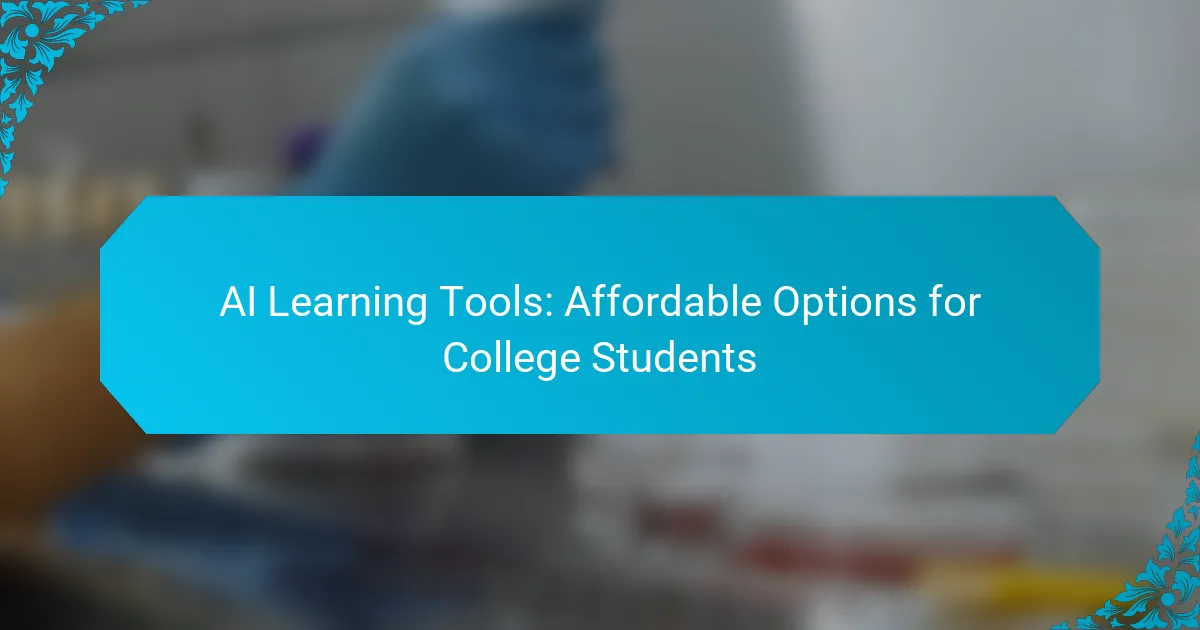Affordable AI learning tools can greatly improve college students’ study efficiency and comprehension. With options like Grammarly, Quizlet, and Khan Academy, students can access valuable resources at little to no cost, making these tools ideal for those on a budget. By leveraging data to adapt to individual learning styles, these tools help students grasp complex concepts and enhance their academic performance.

What Are the Best Affordable AI Learning Tools for College Students?
Affordable AI learning tools can significantly enhance college students’ study efficiency and comprehension. Options like Grammarly, Quizlet, Coursera, Khan Academy, and Notion offer valuable features at low or no cost, making them accessible for students on a budget.
Grammarly
Grammarly is a writing assistant that helps students improve their writing skills by checking for grammar, punctuation, and style errors. The free version offers basic corrections, while the premium subscription provides advanced suggestions and plagiarism detection.
To get the most out of Grammarly, integrate it into your browser or use the desktop app for seamless writing assistance across various platforms. Be cautious not to rely solely on it; always review suggestions critically to maintain your unique voice.
Quizlet
Quizlet is a study tool that allows students to create digital flashcards and quizzes to reinforce learning. It offers a free version with essential features, while the paid version includes advanced study modes and ad-free access.
Utilize Quizlet’s collaborative features to study with classmates or access millions of pre-made study sets. Regularly updating your flashcards can enhance retention and understanding of complex subjects.
Coursera
Coursera partners with universities to provide online courses on various subjects, often at no cost. Students can audit courses for free or pay for certification, making it a flexible option for enhancing knowledge and skills.
When choosing a course, consider your academic and career goals. Look for courses that offer hands-on projects or peer interaction to maximize your learning experience. Keep an eye out for financial aid options if you wish to obtain a certificate.
Khan Academy
Khan Academy offers a wealth of free educational resources, including instructional videos and practice exercises across various subjects. It is particularly useful for foundational topics in math and science.
Students can track their progress through personalized dashboards, making it easy to identify areas needing improvement. Use Khan Academy as a supplementary resource to reinforce classroom learning and prepare for exams.
Notion
Notion is a versatile productivity tool that combines note-taking, task management, and database features. It offers a free plan for students, making it an excellent choice for organizing notes and projects.
To maximize Notion’s potential, create templates for different subjects or projects to streamline your workflow. Regularly update your notes and tasks to stay organized and focused throughout the semester.

How Can AI Learning Tools Enhance Academic Performance?
AI learning tools can significantly boost academic performance by providing tailored educational experiences, optimizing time management, and fostering collaboration among students. These tools leverage data to adapt to individual learning styles, helping students grasp complex concepts more effectively.
Personalized Learning Experiences
Personalized learning experiences are a hallmark of AI learning tools, allowing students to engage with material that suits their unique learning preferences. For instance, platforms like Khan Academy and Coursera use algorithms to recommend courses and resources based on a student’s past performance and interests.
Students can benefit from adaptive quizzes that adjust difficulty levels in real-time, ensuring they are neither overwhelmed nor under-challenged. This tailored approach can lead to improved retention and understanding of the subject matter.
Improved Time Management
AI tools can enhance time management by helping students prioritize tasks and create efficient study schedules. Applications like Todoist and Notion utilize AI to suggest optimal study times based on deadlines and personal productivity patterns.
By analyzing a student’s habits, these tools can recommend when to tackle challenging subjects or when to take breaks, promoting a balanced approach to studying. This can help students avoid last-minute cramming and reduce stress during exam periods.
Enhanced Collaboration
AI learning tools facilitate enhanced collaboration among students, making group projects more manageable and effective. Platforms such as Google Workspace and Microsoft Teams incorporate AI features that streamline communication and file sharing, allowing for seamless teamwork.
Additionally, AI can analyze group dynamics and suggest roles based on each member’s strengths, ensuring that tasks are distributed effectively. This collaborative environment not only improves project outcomes but also fosters essential teamwork skills that are valuable in the workplace.

What Are the Cost-Effective Features of AI Learning Tools?
Cost-effective AI learning tools often include features that enhance accessibility and affordability for college students. These tools typically offer flexible pricing options, free trials, and discounts tailored for students, making them more accessible for budget-conscious learners.
Subscription Models
Many AI learning tools operate on subscription models, allowing students to pay monthly or annually for access. Prices can range from around $10 to $30 per month, depending on the features included. This flexibility enables students to choose plans that fit their budgets and learning needs.
When selecting a subscription, consider what features you need, such as personalized learning paths, tutoring sessions, or access to premium content. Some platforms offer tiered pricing, where higher tiers unlock additional resources or capabilities.
Free Trials
Free trials are a common feature of AI learning tools, allowing students to test the software before committing financially. These trials typically last from one week to one month, giving users ample time to evaluate the platform’s effectiveness. During this period, students can explore various functionalities and determine if the tool meets their academic needs.
To make the most of a free trial, set specific learning goals and track your progress. This approach helps assess whether the tool genuinely enhances your study habits or understanding of the material.
Student Discounts
Many AI learning platforms offer student discounts, which can significantly reduce subscription costs. Discounts often range from 10% to 50%, making premium features more affordable for students. To access these discounts, students usually need to verify their status through a school email or a dedicated verification platform.
Always check for available discounts before purchasing a subscription. Some platforms may also provide additional perks, such as extended trial periods or exclusive content, further enhancing the value for students.

Which AI Learning Tools Are Best for Specific Subjects?
Several AI learning tools cater to specific subjects, making them ideal for college students seeking affordable options. These tools enhance understanding and engagement through interactive features tailored to various academic disciplines.
Duolingo for Language Learning
Duolingo is a popular AI-driven platform designed for language acquisition. It uses gamification to make learning engaging, offering bite-sized lessons that adapt to the user’s proficiency level.
Students can practice vocabulary, grammar, and pronunciation through interactive exercises. The app supports numerous languages, making it a versatile choice for those looking to enhance their language skills without incurring high costs.
Wolfram Alpha for Mathematics
Wolfram Alpha serves as a computational knowledge engine, particularly useful for mathematics students. It allows users to input equations and receive step-by-step solutions, making complex topics more manageable.
This tool is beneficial for understanding concepts ranging from basic algebra to advanced calculus. Students can leverage Wolfram Alpha to check their work and explore different problem-solving methods, enhancing their learning experience.
Codecademy for Programming
Codecademy is an interactive platform that teaches programming through hands-on coding exercises. It covers various programming languages, including Python, Java, and HTML/CSS, making it suitable for beginners and advanced learners alike.
Students can progress through structured courses at their own pace, gaining practical skills that are valuable in today’s job market. Codecademy often offers free content, with additional features available through a subscription, providing an affordable way to learn coding.

What Are the Key Criteria for Choosing AI Learning Tools?
When selecting AI learning tools, consider factors such as user-friendliness, integration with existing educational platforms, and the availability of support and resources. These criteria ensure that the tools enhance learning without adding complexity or requiring extensive training.
User-Friendliness
User-friendliness is crucial in AI learning tools, especially for college students who may have varying levels of technical expertise. Look for platforms with intuitive interfaces that allow easy navigation and quick access to features. Tools that offer tutorials or guided setups can significantly enhance the user experience.
Consider tools that provide customization options, enabling users to tailor the interface to their preferences. This can improve engagement and make learning more efficient, as students can focus on content rather than struggling with navigation.
Integration with Existing Tools
Effective AI learning tools should seamlessly integrate with the software and platforms already in use, such as learning management systems (LMS) or collaboration tools. This integration minimizes disruption and allows for a smoother transition, making it easier for students to adopt new technologies.
Check if the AI tools support popular platforms like Google Classroom or Microsoft Teams, as this can enhance functionality and streamline workflows. Compatibility with existing resources ensures that students can leverage their current tools while benefiting from AI enhancements.
Support and Resources
Access to support and resources is essential when choosing AI learning tools. Look for platforms that offer comprehensive help centers, tutorials, and responsive customer service. This support can be invaluable, especially when students encounter challenges or have questions about using the tool effectively.
Additionally, consider whether the tool provides community forums or user groups where students can share tips and experiences. These resources can foster collaboration and help users maximize the benefits of the AI learning tools they choose.
